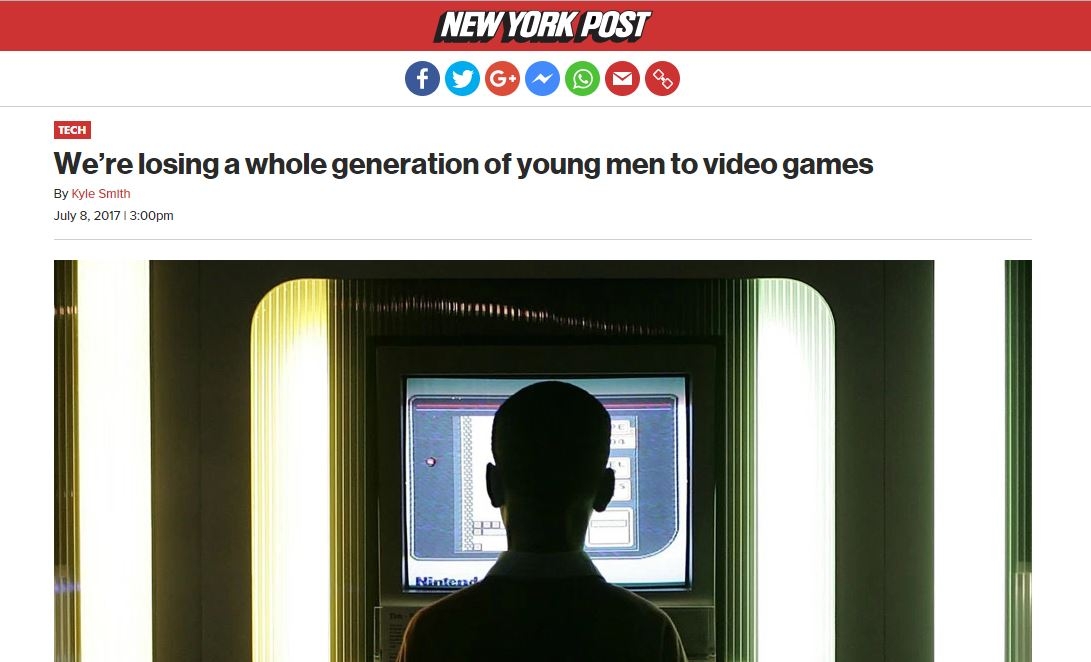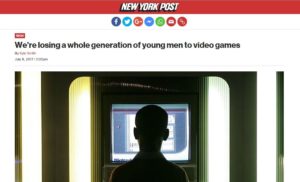

Grant Stoner | Staff Writer
I’m no stranger to stereotypes. My wheelchair is a proverbial magnet for attracting comments where people think that I am intellectually disabled. If I go to a store and purchase a bag of chips, cashiers with obnoxiously high-pitched voices tend to ask if I’m going to eat the whole bag by myself.
Yes, I will.
On days where my disability is extensively noticed by the public, I tend to escape into the fantastic virtual worlds of video games. Unfortunately for me, my hobby is also subject to outdated, often unfounded, stereotypes.
We’re nerds.
Losers.
Basement dwellers.
In a recent article published by the New York Post, Kyle Smith argued that video games were directly responsible for the decline in both work hours and manpower, as gaming is far more appealing than earning an income.
“A huge proportion of young men are simply dropping out of the workforce and becoming PlayStation’s willing slaves,” wrote Smith. “The numbers are in a National Bureau of Economic Research study and in an essay by economist Erik Hurst of the Booth School of Economics at the University of Chicago.”
Smith is referring to the 12 percent decrease in labor hours in 2015 compared to 2000, coupled with the fact that 51 percent (not 35 as he incorrectly cited) of young men ages 21 to 30 were residing with family members in 2015.
The problem, according to Smith, is that video games have become so addicting, that these individuals refuse to leave their homes.
Yet, if we examine his sources, specifically this essay written by Hurst, it becomes evident that Smith simply cherry-picked certain sentences which supported his already weak argument.
“US manufacturers have switched from labor-intensive production to capital-intensive production. Instead of hiring a worker for the assembly line, manufacturers now use machines to do the work,” Hurst noted.
Prior to that statement, Hurst acknowledged that technological advances in the workforce have resulted in a steady decline of employment rates between 2000 and 2015. The recession of 2008 dramatically affected employment rates, as well.
Further on in his essay, Hurst evaluated how young men spent their free time. The majority of individuals surveyed admitted that video games were their primary source of entertainment.
“The average young, lower-skilled, nonemployed man in 2014 spent about two hours per day on video games. That is the average. Twenty-five percent reported playing at least three hours per day. About 10 percent reported playing for six hours per day,” Hurst stated.
These hours are far from the “substitute for living” that Smith claimed.
But, I digress. Perhaps Smith redeemed himself toward the end of his piece.
“Should we dismiss all this if these men say they’re happy? Heroin addicts are happy, too, as long as they’re high, but what long-term effects do they face?”
Give me a minute, I’m experiencing heart palpitations.
Games are comparable to heroin?
Heroin, according to a study conducted by the CDC, resulted in the deaths of 12,989 individuals in 2015, 10 more deaths than those committed by firearms.
Unfortunately, Smith’s stereotypes don’t stop there.
“Gamer zombies risk losing touch with both the world of work and with the potential for real human relationships,” he stated.
Personally speaking, I average roughly four to five hours per day on gaming. As a disabled gamer, video games have given me countless opportunities to interact with friends, some of which I have had the pleasure of meeting in real life. And when I’m not holding a controller, I tend to spend time with friends at the movies or local bars.
Am I addicted? According to Smith, yes. But, my “addiction” has allowed me to be sociable. When my physical disability prohibits me from spending time with family or friends, I can easily log onto Overwatch, where I have no limitations.
It is 2017, and gamers are still plagued by obnoxious stereotypes. For those who are unwilling to learn, gaming is for the awkward and unloved. Yet, for the socially progressive, gaming is quickly becoming one of the highest forms of entertainment, and it is often praised for its capability to bring people together. As of April, over 58 million units of the PlayStation 4, as well as 28 million units of the Xbox One, have been sold worldwide. Those numbers continue to grow, meaning that videogames are no longer a niche hobby.
I have grown tired of having to defend my favorite medium to the ignorant masses. Articles and broadcasts which label gamers as less than human need to truly examine gaming before publication. These surface-level arguments are nothing short of embarrassing.




